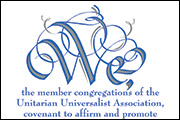Who says Unitarian Universalism's Principles are easy?
The UU Principles are demanding enough to make me whine.
My cousin Ed the Brave would carry a transistor radio in his pocket and run the earphones up through his shirt so you could barely see the wire carrying music or a ball game to his ear. The church of my childhood had big plain windows, eggshell walls, red carpet. I think the most exciting thing that ever happened in church was when the man in front of me held so still that a small spider was able to spin a web in the angle of his neck, stretching the silk from his ear to the shoulder of his gray suit, making a perfect design that was only disturbed when he rose to sing the last hymn.
We colored in our bulletins and we looked through the hymnals and made ourselves giggle by adding “between the sheets” to their titles. A Baptist friend says she and her friends added “in the bathtub.” “Turn Back, O Man,” between the sheets. “We Three Kings of Orient Are” in the bathtub.
Years ago I came into this Unitarian Universalist community of faith. I’m home. I listen to people talk sometimes about liberal religion as if it’s a thin gruel, watered down to please everyone. Our Seven Principles, they complain, are either too much like a creed or so general as to be meaningless.
My experience of the Principles is that they are deeply demanding. The first one asks me to affirm and promote the inherent worth and dignity of every person, which means that I can no longer subscribe to the cheerful Calvinist doctrine of the total depravity of human nature. It sounds grim, but really, if you are in fact starting with a totally depraved nature, the opportunities for self-congratulation abound: “Hey, I didn’t knock over a 7-Eleven this afternoon, even though money’s pretty tight. I’m doing well!”
Now I have to struggle with the worth and dignity of people who do unspeakably awful things, whereas the doctrine of total depravity made that one a no-brainer. I’m supposed to value the democratic process, hearing the voice of everyone equally, allowing everyone to have a say. The UU Principles are demanding enough to make me whine.
For those who feel they are thin gruel, I have a suggestion. Let’s stick something onto the end of every Principle that will stop people from smiling and nodding comfortably as they are read. Instead of adding “in the bathtub” or “between the sheets,” how about attaching “beginning in our homes and congregations”?
Then we’d be faced with affirming things like “the goal of . . . peace, liberty, and justice for all, beginning in our homes and congregations.” Everyone who has raised children knows that peace is often at odds with liberty and that justice demands a disturbance of the peace. To put those three together in one Principle is outrageous and lovely. It’s easier to think about working towards them in a global context than in the context of Cheerios and pajamas, car keys and cleaning up one’s bedroom.
“Justice, equity, and compassion in human relations, beginning in our homes and congregations” is a sobering ideal. I don’t know about you, but I have sat in meetings about right relations and seen people get testy with one another. Some of the nastiest behavior I’ve seen was long ago at a community workshop for peace activists.
Lao Tse, quoted in the back of our hymn book, says peace in the world begins with peace in the home, which begins with peace in the heart. If I start with my own heart, the demands of our Principles get even heavier. Peace and compassion in my heart? Justice too? Freedom as well? Affirming the worth of every person all the time, not only with my words and my behavior but in my secret heart?
If we added “in the heart” to the Principles, they might as well just say “Be Jesus” and be done with it. I’m sorry I even brought it up.
For me, the heart of the liberal faith is to be connected to something greater than yourself; to wallow in the Spirit of Life, Love, and Truth; to have fair trade coffee and important conversations; to stand for love and to stand against quibbling, complaining, and flouncing off in a huff; to move toward being in right relationship with ourselves, one another, and the planet.
For me, this faith isn’t a thin gruel. It’s not even a rich and hearty gruel. It’s walnuts and bananas, pancakes, mangoes, arugula, ginger, and avocado. The feast is prepared with effort, enjoyment, persistence, and commitment. Care to join me?
See sidebar for links to related resources.








